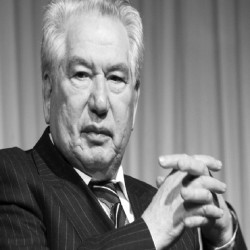
Chinghiz Aitmatov
Kyrgyz Author
| Date of Birth | : | 12 Dec, 1928 |
| Date of Death | : | 10 Jun, 2008 |
| Place of Birth | : | Sheker, Kyrgyzstan |
| Profession | : | Author, Screenwriter |
| Nationality | : | Kyrgyz |
Chinghiz Torekulovich Aitmatov was a Kyrgyz author who wrote mainly in Russian, but also in Kyrgyz. He is one of the best known figures in Kyrgyzstan's literature.
Biography
Aytmatov’s father was a Communist Party official executed during the great purges directed by Soviet leader Joseph Stalin in the late 1930s. Aytmatov’s literary career started in 1952, and in 1959 he began writing for Pravda as the newspaper’s correspondent in Kirgiziya. He achieved major recognition with the collection of short stories Povesti gor i stepey (1963; Tales of the Mountains and Steppes), for which he was awarded the Lenin Prize in 1963. Although Aytmatov composed in both Russian and Kyrgyz, many of his works, which are predominantly long short stories and novellas, were originally written in the latter language. Major themes in these works are love and friendship, the trials and heroism of wartime, and the emancipation of Kyrgyz youth from restrictive custom and tradition.
Among Aytmatov’s most important works are Trudnaya pereprava (1956; “A Difficult Passage”), Litsom k litsu (1957; “Face to Face”), Jamila (1958; Eng. trans. Jamilia), Pervy uchitel (1967; “The First Teacher”), Proshchay, Gulsary! (1967; Farewell, Gulsary!), and Bely parokhod (1970; The White Ship, also published as The White Steamship ). Subsequent novels, written originally in Russian, include I dolshe veka dlitsya den (1981; The Day Lasts More Than a Hundred Years), which blends Central Asian folklore traditions with science fiction, as well as Plakha (1986; The Place of the Skull) and Tavro Kassandry (1995; “The Mark of Cassandra”). He also cowrote, with Kaltai Mukhamedzhanov, Voskhozhdenie na Fudziyamu (first performed 1973; The Ascent of Mount Fuji), a play considered provocative during the Soviet era for its examination of the themes of authority and dissent. Many of Aytmatov’s stories appear in English translation in Piebald Dog Running Along the Shore, and Other Stories (1989) and Mother Earth, and Other Stories (1989).
Aytmatov was made a member of the Supreme Soviet of the U.S.S.R. in 1966. In 1967 he became a member of the Executive Board of the Writers’ Union of the U.S.S.R., and he was awarded the Soviet State Prize for literature in 1968, 1977, and 1983. He served as an adviser to Soviet President Mikhail Gorbachev and as the Soviet ambassador to Luxembourg. From the 1990s Aytmatov was the Kyrgyz ambassador to the European Union and several European countries. He also served as a member of parliament in Kyrgyzstan.
Quotes
Total 16 Quotes
Where are you now? What roads are you treading? We have so many new roads now, right across the steppe all the way to the Altai and Siberia. Many brave souls are toiling there. Perhaps you're among them? You left, my Jamilia, across the wide steppe without a backward glance. Perhaps you are weary, perhaps you have lost faith in your self? Just lean on Daniyar's shoulder. Have him sing to you his song of love, of life, of the earth. May the steppe come alive and blossom in all its glory. May you recall that August night. Keep on, Jamilia, have no regrets; you've found your hard-sought happiness. When I gaze at them long enough I can hear Daniyar's voice. He is calling to me, too, to take the highroad, which means it is time for me to get ready. I shall cross the steppe back to my village and find fresh colours there. May Daniyar's song resound and may Jamilia's heart beat with every stroke of my brush.
But a man cannot remain indifferent to the world around him; it worries him and torments him to think that he could be happier somewhere else, and that he is where he is simply through a mistake of fate.
Fainting with heat, he suddenly found himself in the cold, cold river. He had turned into a fish. Tail, body, fins – everything was fishlike, except the head, which was his own and still ached. He swam through the muted, cool, underwater darkness and thought that now he would remain a fish forever and never go back to the moutains. “I won’t return,” he said to himself. “It’s better to be a fish, it’s better to be a fish.
I was astounded at the passion and fire of the melody itself. I could not describe it then, nor can I now. Was it just his voice or something more tangible emerging from his very soul that could arouse such emotion in another person, and bring one’s innermost thoughts to life?
Yes, there will be winter, there will be cold, there will be snowstorms, but then there will be spring again.
At that time I was making the largest salary known on television and I didn't want to see it die because those were the years paying off when I wasn't making anything.
